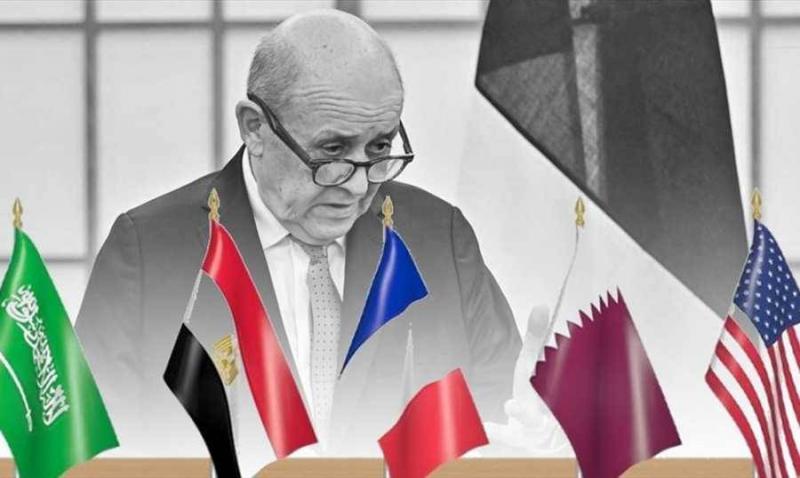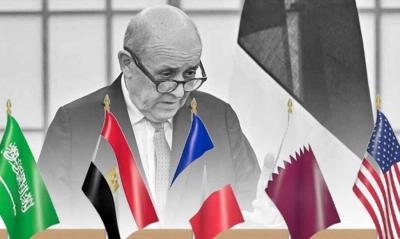French envoy Jean-Yves Le Drian is conducting bilateral talks today and tomorrow in Beirut with various Lebanese parties as part of the third round of his mission aimed at unraveling the complexities of the presidential deadlock in Lebanon. He seeks to provide a defined framework to extricate this issue from the realm of political conflict, benefiting from a "conciliatory landscape" in the region undergoing transformations on multiple fronts, some of which are bilateral while others have deep geopolitical implications that threaten to reshape the region and its interests, as demonstrated by the giant economic corridor linking India and Europe via the Middle East.
According to "Al-Rai Al-Kuwaiti," despite attempts to suggest that Le Drian's current mission is driven by the "fuel" of his country's partners in the "Group of Five on Lebanon" (the United States, Saudi Arabia, Egypt, and Qatar), in connection with a meeting that was supposedly held prior to his transition to "the land of the cedars" yesterday with Saudi Minister Nizar Al-Alula and Ambassador to Beirut Walid Bukhari, this effort is insufficient to expect that the personal envoy of President Emmanuel Macron will achieve a breakthrough in the thick wall still surrounding the Baabda Palace.
Le Drian, who will witness firsthand the ongoing dangerous explosion since Thursday in the Ain al-Hilweh camp, which has been exacerbated with implications related to the Palestinian file amid the multi-front regional conflicts, will continue from where his second round concluded. He will replace the proposed expanded meeting among Lebanese parties, which the majority of the opposition thwarted, with separate discussions with each party, examining the substance of the answers received—or not received—to the two questions he posed to lawmakers regarding the characteristics and priorities of the president, inquiring about the potential to establish a practical mechanism in accordance with a defined "timeline" to open Parliament and complete the electoral process as stipulated by the constitution, as called for by the "Group of Five," after narrowing the gaps in divergences as much as possible.
It was not possible yesterday to ascertain whether Le Drian, who is preparing to commence a prominent assignment in Saudi Arabia (as the head of the French Development Agency in Al-Ula), carries a new comprehensive proposal, nor the fate of his mediation if he fails to open a serious breach in the presidential deadlock. Reports have suggested that Qatar is awaiting the outcome of the French envoy's visit to continue a role it has been playing behind the scenes. Meanwhile, a significant development has emerged in recent days with the rising candidacy of Army Commander General Joseph Aoun as a serious candidate who enjoys notable external acceptance, overcoming internal barriers. This might not secure his election; at the very least, it could lead to an announcement of "no objection" to his election, as expressed by Hezbollah in his regard, which has remained open to interpretations between:
- The possibility of it being a maneuver or a "fire cover" to ensure the election of the leader of the Marada Movement, Sleiman Frangieh, by making the "Free Patriotic Movement" engaged in dialogue with Hezbollah feel "the heat." The movement attempted through its synergy with the opposition proposing Jihad Azour to distance Frangieh and believes that by resuming serious communication with Hezbollah under the pretext of dismissing the "impossibility" of supporting the Marada leader, it aims to block the army commander and pass the time until General Joseph Aoun retires, as they believe this places him on the "presidential reserve bench."
- Hezbollah has begun to approach the presidential file with a completely different strategic priority connected to fears of the repercussions of bringing in a president along a vertical divide by a simple majority, amidst their discussions about a plot to drown in a quagmire of internal clashes. Some of its features are read between the lines of scenarios pushing Israel to resolve land disputes along the blue line and even possibly urging it to withdraw from the Shebaa Farms, hoping to make the weapon issue a trigger for Lebanese clashes on the brink of civil war. This development coincides with a conviction that the Iranian appeasement with Saudi Arabia must resonate in Beirut, particularly in the presidential file, allowing a "positive connection" with the United States concerning other regionally and internationally significant issues for Tehran.
In a related context, MP Bilal al-Hachimi asked in a statement to "Al-Anbaa" electronic news: "Can Le Drian convince Hezbollah to abandon support for Frangieh?" He considered that "the head of the Free Patriotic Movement, Gebran Bassil, has not spoken, for a long time, as a statesman, because he views Lebanon as an institution or a joint-stock company, and he wants his share of it, sometimes through the sovereign fund and other times through administrative decentralization."




